A woman pays tribute at a church in Jaffna this morning.
Today marks two years since a series of bomb attacks targeting churches and luxury hotels on Easter Sunday, killing 279 people and injured more than 500 others.
The attacks, staged by eight bombers who all killed themselves in the attack, saw eight blasts reported in total, attacking luxury hotels and churches in Colombo and Batticaloa.
Hotels hit by explosions include the Shangri-La, Kingsbury and Cinnamon Grand hotels and one other, all in Colombo. The three churches struck were the Catholic Shrine of St. Anthony in Kotahena, Colombo, the Catholic Church of St. Sebastian in Negombo and the Zion Church in Batticaloa. At least 45 foreign nationals were amongst the dead.
Though the Islamic State claimed responsibility for the attacks, with the lesser-known jihadist group National Thowheed Jamaath (NTJ) involved, it soon emerged that Sri Lankan intelligence services were aware that an attack was due to take place on Easter Sunday.
The aftermath of the attack saw reports of senior Sri Lankan figures being complicit with the previously little known NTJ, mob violence against Muslims and a ramping up of militarisation and securitisation across the island that persists to this day.
The blasts on the day
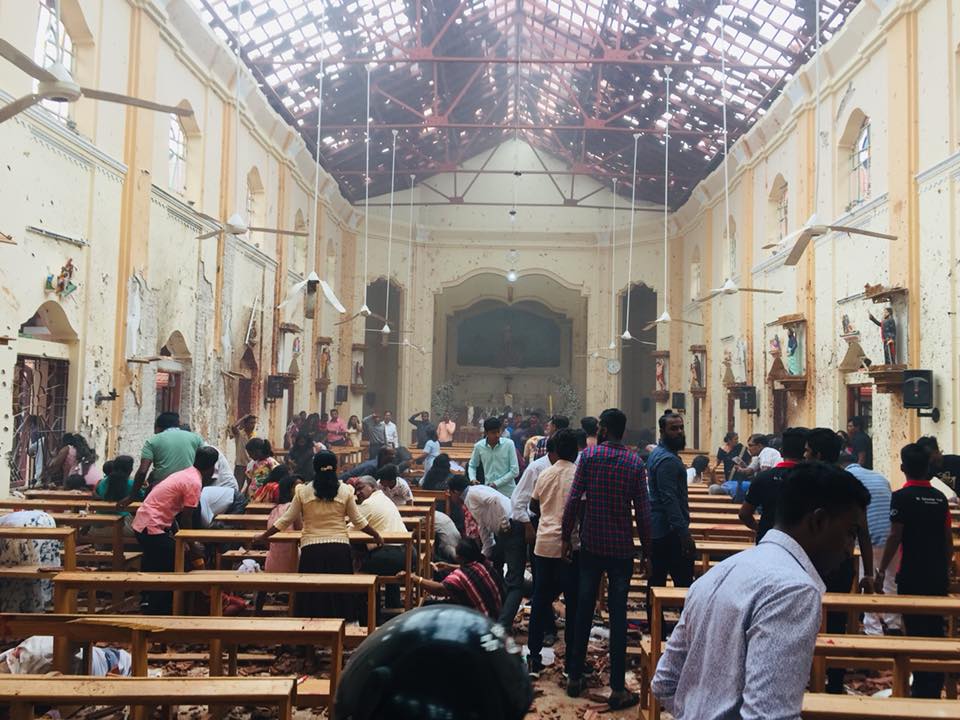
The aftermath of one of the bombs.
As initial reports of the blasts came through on the early hours of Easter Sunday, it soon emerged that the attacks were suicide bombers. An island wide curfew was declared by the Ministry of Defence and the Sri Lankan military stepped up its presence across the island and in key institutions, including Colombo’s international airport.
Read our coverage of the attacks here:
Over 250 killed as ISIS claims responsibility for Sri Lanka bomb attacks
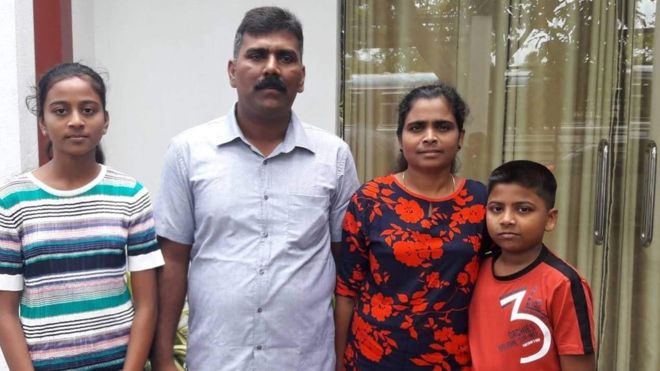
Ramesh Raju and his family.
Amongst the dead was 40-year-old Ramesh Raju, who stopped one of the bombers from entering the church hall in Batticaloa, where a Sunday school packed with children and just finished. Fourteen children were among the dead in Batticaloa. Though he died in the blast, Ramesh’s actions saved the lives of many.
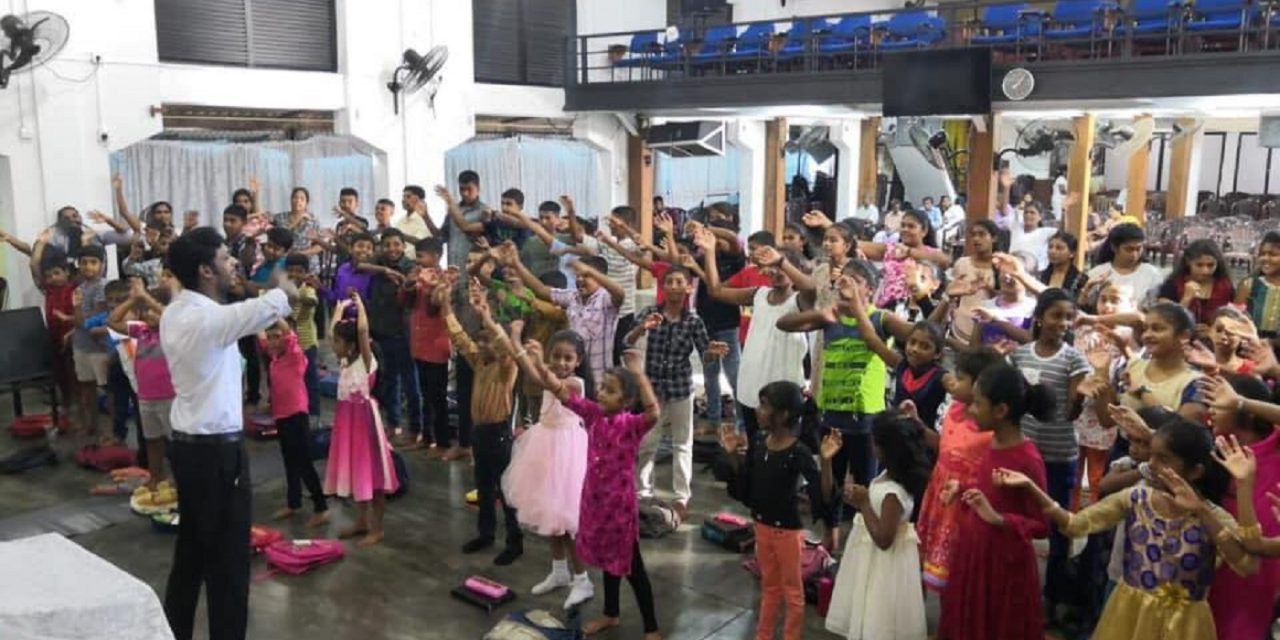
A Sunday school class at the Zion Church in Batticaloa. A similar class was underway when the bomber struck.
Read more about Ramesh’s actions on the BBC here.
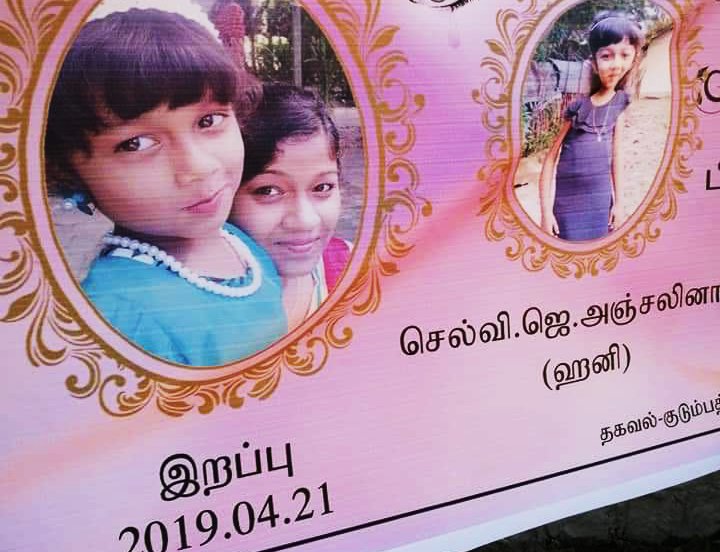
A banner for victims of the Easter Sunday attack in Batticaloa.
Fourteen children were killed during the bombing of Zion church in Batticaloa. Read more about those children in our pieve below:
Read more on the attacks, the victims and the tributes that followed in our pieces below:
Batticaloa mourns children killed in Zion church bombing
Tributes paid across North-East for victims of Easter Sunday blasts
'Amma!' cry out children as mother succumbs to Zion church blast injuries
Death toll from Easter Sunday attack rises in Batticaloa
Injured Batticaloa bombing victim dies
Pre-school holds vigil for Zion church victims
Eastern University student succumbs to Zion Church attack injuries
‘Vested interests’
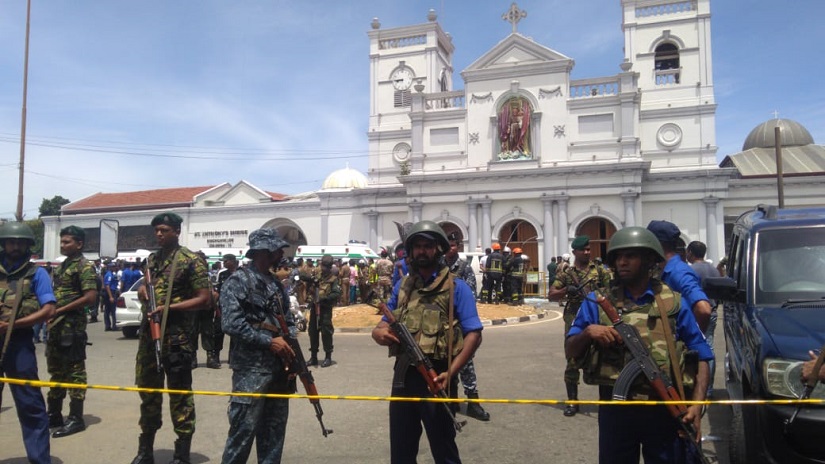
Sri Lankan security forces outside a church in Colombo.
Within hours of the bombs going off, reports had already emerged that the Sri Lankan security forces had been warned internationally that an attack was to take place. Subsequent investigations discovered that then-President Maithripala Sirisena and senior Sri Lankan intelligence leaders were warned by India about the attacks 17 days before they were staged. Those warnings were ignored.
Sri Lanka’s Presidential Commission of Inquiry (PCOI) revealed Sirisena received several a call from State Intelligence Service Director Nilantha Jayawardena warning him that an attack was imminent, just minutes before bombs ripped through churches and hotels on the island, killing hundreds.
Months after the attacks, Sri Lanka’s own Parliamentary Select Committee (PSC) report said the security forces may have allowed the bombings to proceed in order to “create chaos and instil fear” ahead of presidential elections that took place in 2019. The report highlights that Sri Lanka’s intelligence officials had known the names of five of the 6 suicide bombers but failed to act to prevent the atrocities.
The report said that “further investigations will be needed to understand whether those with vested interests did not act on intelligence so as to create chaos and instil fear and uncertainty in the country in the lead up to the Presidential Election”.
It went on to state,
“Such a situation would then lead to the call for a change of regime to contain such acts of terrorism. Coincidently or not so coincidentally, the security situation and fear would be unleashed months away from the Presidential Election… These are extremely serious observations that can impact the democratic governance, electoral processes and security of Sri Lanka and must require urgent attention.”
The report also questions whether Zahran Hashim, leader of the National Thowheed Jamaath, and the alleged mastermind behind the attacks “had the support and patronage of some politicians and intelligence”.
“These cannot be taken as coincidental and must be investigated further,” the report concluded. “It is also paramount to question the role of some sections in the intelligence apparatus and their attempts to shape security, the electoral process, political landscape and the future of Sri Lanka.”
Tamil National Alliance parliamentarian M A Sumanthiran highlighted the findings of the PSC report which maintained that a need for further investigations to determine whether “whether those with vested interest did not act on intelligence so as to create chaos and instil fear and uncertainty in the country in the lead up to the presidential election to be held later in the year”.
“Coincidentally or not so coincidentally, the security situation and fear would be unleashed months away from the Presidential elections the PSC also notes that this occurred in the context of changes in the leadership in the Sri Lankan Army and the DMI in 2019” he added.
See the full text of the report here.
The 2019 elections saw a landslide victory of Gotabaya Rajapaksa who campaigned on a Sinhala nationalist ticket and attacked the administration for allegedly weakening national security.
Vavunathivu checkpoint. November 30, 2018
In the aftermath of the attacks, several sources claimed that Rajapaksa had links to those that carried out the attacks. Several Sri Lankan Parliamentarians have claimed that members of National Thawheed Jammath (NTJ) who were deemed responsible for the attacks were being paid by Sri Lankan intelligence and had established links with Gotabaya Rajapaksa. An office in Colombo was claimed to be given to the now-banned group by Gotabaya.
Rajitha Senaratne, Sri Lanka’s health minister, claimed that at least 26 members of the recently banned NTJ, who are being blamed for the Easter Sunday attacks, were being paid by Sri Lankan intelligence and linked to Gotabaya Rajapaksa, adding that at least four army officers were involved in organising the assassination of police officers in Batticaloa in 2018.
Former Inspector General of the Police, Pujith Jayasundara, testifying before the Presidential Commission of Inquiry probing the 2019 April attacks, claimed that the bomber of the Tropical Inn in Dehiwela had met with an intelligence official 45 minutes before he blew himself up.
Backlash against Muslims
In response to the bombings, Sri Lankan declared it would ban the burqa as anti-Muslim violence by Sinhala mobs erupted, with the collusion of Sri Lankan soldiers. At least one man was killed as as Sinhalese mobs attacked several mosques, set ablaze shops and stoned Muslim homes in the Kurungela District.
In Negombo hundreds of Pakistani Muslims were forced to flee their homes fearing further violence. Reuters reported that the local community have organised buses, after threats from of revenge attacks and reports that some Muslims have been evicted from their homes. The New York Times also reported attacks on individuals, including a mob attacking Pakistani refugee Auranzeb Zabi and his children, as he ran towards an army checkpoint. It added,
“There the mob caught up with him, he said, and delivered a harsh beating, begging the soldiers to let them kill him.”
In Negombo, gangs reportedly moved from house to house, smashing windows and attacking Muslims and threatening to kill them.
See our coverage below:
Muslims attacked and fleeing their homes in Sri Lanka as violence flares
Sri Lankan security forces colluded in anti-Muslim riots - JDS video
A legacy of militarisation
As services and memorials are being held around the world to commemorate the attacks, two years on the island remains plagued by a climate of extreme militarisation and growing ethnic tensions. As Sri Lankan politicians continue to trade blame over responsibility for the attacks, the security forces have ramped up arrests of Tamils and Muslims across the island, particularly after Rajapaksa assumed office.
Earlier this year, a report by the United Nations human rights chief warned of the “seeds of future violence and conflict” in Sri Lanka, as she detailed continuing ethnic tensions and rising human rights violations.
"The attacks, though distinct from the decades of interethnic conflict on the island, were not felt in a vacuum and only exacerbated existing fault lines," wrote the Tamil Guardian in an editorial last year. "Sri Lanka has not yet broken out of its endemic cycles of violence. The divides remain unaddressed and, under a more militarised and more authoritarian regime, now stand even starker."
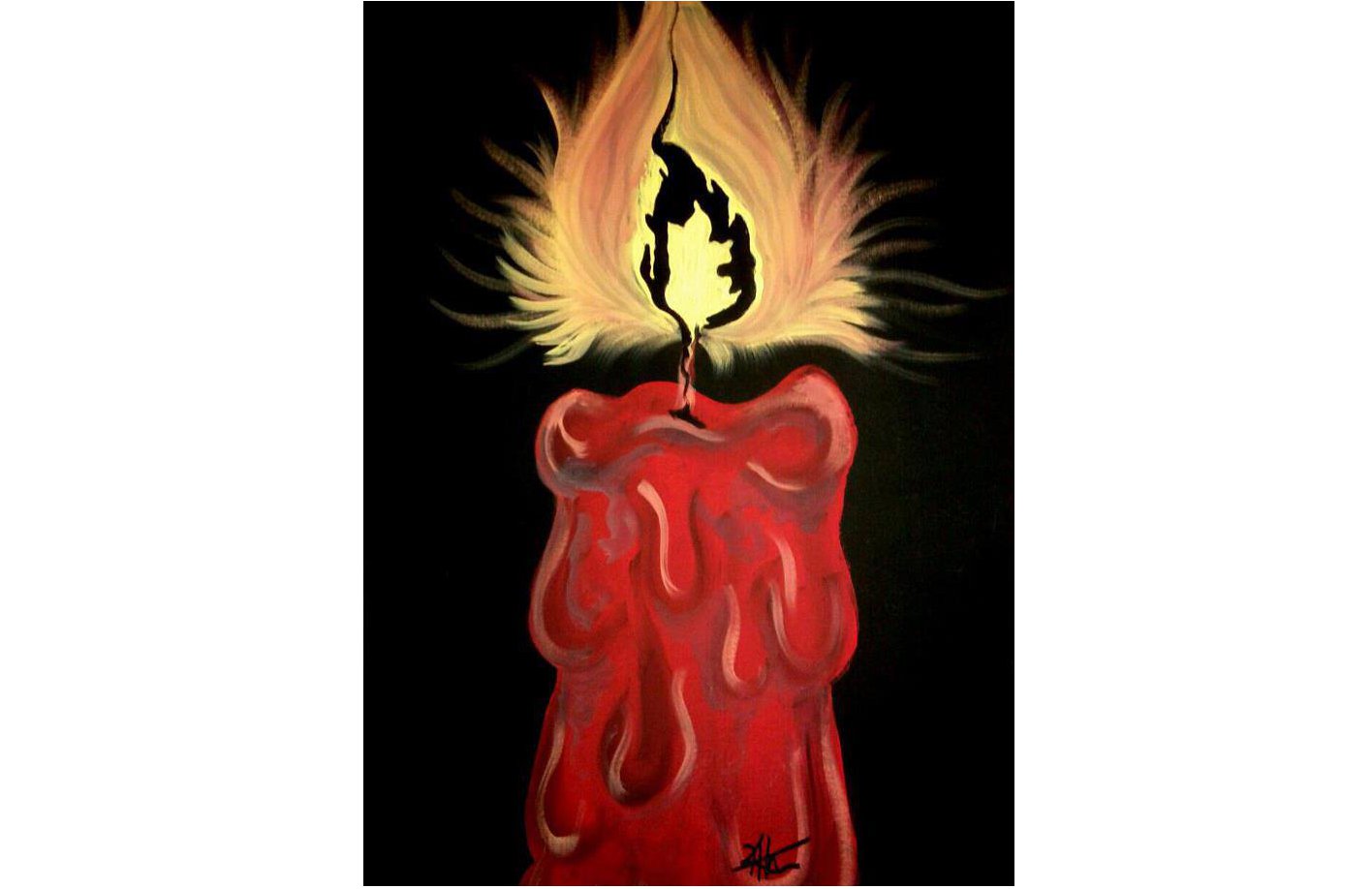
We need your support
Sri Lanka is one of the most dangerous places in the world to be a journalist. Tamil journalists are particularly at threat, with at least 41 media workers known to have been killed by the Sri Lankan state or its paramilitaries during and after the armed conflict.
Despite the risks, our team on the ground remain committed to providing detailed and accurate reporting of developments in the Tamil homeland, across the island and around the world, as well as providing expert analysis and insight from the Tamil point of view
We need your support in keeping our journalism going. Support our work today.
For more ways to donate visit https://donate.tamilguardian.com.

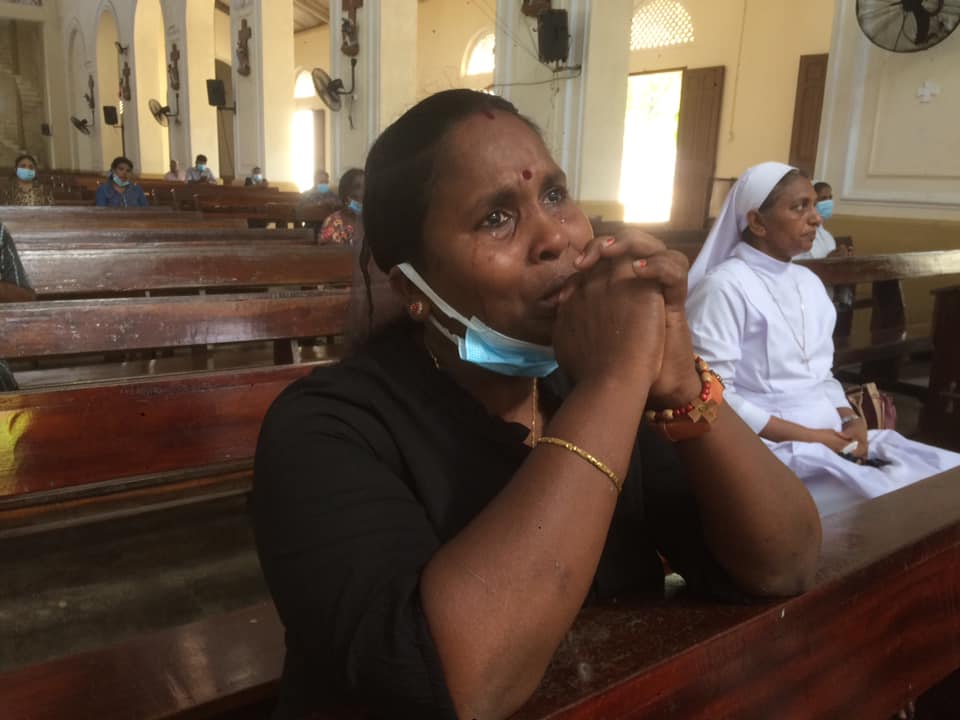
.JPG)
